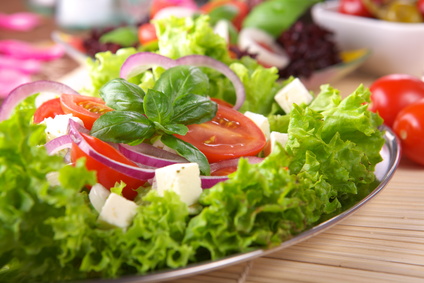
by Cindy Johnson

Eating healthy on vacation can be a real challenge, especially if you are on a budget. No matter how carefully you plan, food costs – especially from eating out- can blow out your budget, and can also ruin a healthy diet.
For most of us, healthy lifestyle resolve can be destroyed in just a few days of weak-willed temptation. And vacations are full of temptation.
Here are a few tips to stay on track with your healthy lifestyle and stick to a budget during a vacation, whether you’re traveling alone, as a couple, with family, or in a group.
1. Book Smart
If you’re traveling with a group, it’s often much cheaper to rent a luxurious vacation home than to book separate hotel rooms. Most of them come equipped with a full kitchen and a barbeque grill as well as many additional amenities and the simple pleasure of privacy.
Other less expensive options are inclusive vacations like cruise ships or bed & breakfast. If the best you can afford is a simple hotel room, find out if a mini-fridge and microwave are available and plan to pick up or bring along a cheap disposable hibachi.
2. Skip the Ordinary and Plan Ahead
If your hotel or lodging does not have a refrigerator, bring a cooler along and fill it with healthy snack and breakfast items. Fresh fruit from a local market, some creamy cottage cheese, and fresh-baked whole grain rolls from a nearby bakery are much better than breakfast options from most restaurants.
Unless it’s a legendary local cuisine that is on the travel agenda as a can’t-miss experience, skip it. You can have greasy omelets loaded with meat and cheese with a side of sausage and gravy at home…if you must.
You can also stock up protein or fiber bars, whole grain crackers, and a block of cheese for a delicious late-night snack. Your in-room snacks are the easiest area of the vacation to control and the most likely to spin out of control if you don’t plan. It’s just too easy to pick up the phone and have room service send up a couple of $12 burgers when you’re tired and hungry.
3. Avoid Chain Restaurants
One of the great joys of traveling is sampling local cuisine. Check online for restaurants that the locals favor, and skip anything that looks like a chain.
Use internet sites like urbanspoon.com or yelp.com to choose restaurants by cuisine, view the menu, and check prices. Look for places that advertise regional specialties and mention fresh ingredients.
4. Watch Those Sneaky Treats
Some areas are well-known for tasty treats. You simply cannot leave Key West, Florida without trying the Key Lime Pie.
However, a deadly variation, frozen pie on a stick dipped in dark chocolate, has become the ubiquitous temptation of the moment. Pass. It’s not only expensive, it is not the simple authentic treat that Key West is famous for.
There are plenty of little family restaurants and street-corner bodegas where you can get the real thing…for half the price.
5. Find a Spectacular Spot and Grill Something
Memorable dining is not limited to restaurants. Some of our most powerful memories are simple meals cooked outdoors. Imagine grilling freshly caught fish while the moonlight illuminates gentle ocean waves, or chicken and veggie kabobs as the sun sets on a mountainside retreat.
Dinner in the wild can be anything from a romantic interlude to a rousing family picnic, but one thing is certain. It will become memory legend.
6. Stop at Roadside Stands or Local Markets
Roadside stands and small flea markets are goldmines for local produce, meats, and seafood. You’ll find an array of foods that are minimally processed, freshly picked, and super cheap. You may even be lucky enough to find homemade jams, jellies and spreads from local sources.
As a bonus, locals know everything. Get to know them and they’ll share area secrets from offbeat fun spots to the best hometown nightspots.
While you’re picking up delightfully fresh food, you’re also boosting the local economy and spending your money where it really counts – on small businessmen with no pricey overhead. Fresh produce directly from farm to table? Yes, please! Ask the right questions and you could luck into seafood right off the boat, a local meat market, and even the county fair award-winning baker that sells pies hot from the oven out of her own kitchen.
Just remember – if you’re traveling abroad, natives might not have the same standards of cleanliness and food safety. Make sure what you buy is fresh, clean, and kept properly refrigerated (or on ice) if necessary, especially when buying fish or meats.
The key to keeping your food budget in check during a vacation is to plan ahead. Pick a meal or two to splurge on and keep the menus and preparation simple for the remainder of your stay. If you’re traveling in a group, divide up the meals and assign a group (or couple) to plan, shop, prepare, and cook each evening. Family-style meals are a great way to save money and eat healthy.
(Cindy Johnson is a 26 year old freelance writer with a new passion for healthy eating and healthy lifestyle that she hopes will help her overcome some health challenges. She loves to travel and is an avid fan of Dr. Oz. Read her Dr. Oz show recap blog. When she’s not writing, Cindy loves to hike in the mountains of North Carolina, where she lives with her husband, son, and a small assortment of dogs.)




